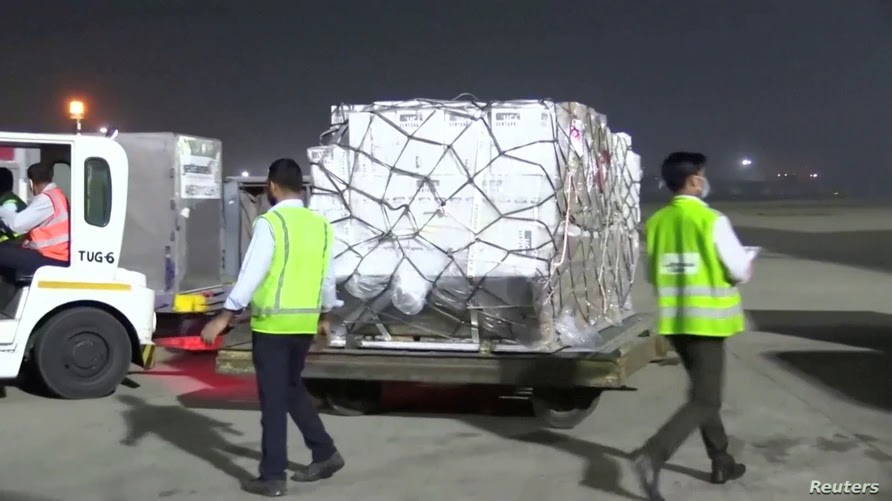Medical Supplies Arrive In India As Coronavirus Cases Hit New Records (Photos)
India hit record numbers of Covid-19 infections worldwide for the sixth day running on Tuesday as the country and its overstretched health systems started receiving vital medical supplies to deal with the pandemic.
A total of 323,144 new cases and 2,771 deaths were registered, Health Ministry data showed, taking the national caseload to 17.6 million cases and the death tally to 197,894.
India has been logging over 300,000 cases since Thursday, when it surpassed the previous highest one-day spike of around 300,300 cases in the United States in January. The country has also been seeing its highest daily number of deaths over the past week.



Several nations have pledged support, with the first shipment of Covid medical supplies – including 100 ventilators and 95 oxygen concentrators – arriving from Britain early on Tuesday, the Foreign Ministry said.
The European Union said it was sending a shipload of medical aid – which includes 78 oxygen concentrators, supplies of anti-viral drugs and hundreds of ventilators.
Germany and France were also separately sending medical aid, including oxygen production capabilities and generators.
“France and India have always remained united: We are doing all we can to help. Our ministries and departments are working hard. …Unity is at the centre of our nation. This spirit is behind the friendship between our countries. Together, we will win,” French President Emmanuel Macron wrote in a post in Hindi on Facebook.
The first “Oxygen Express” train carrying around 70 tonnes of the life-saving gas also reached the Indian capital on Tuesday, after which oxygen was disbursed to hospitals that have been sending distress messages in the past week.
The oxygen crisis was behind 14 more deaths in four states including Maharashtra, the worst-affected state, on Monday, the Times of India daily reported.

India has also turned to its armed forces who will rope in retired personnel and medical professionals from their ranks to help fight the pandemic. It has converted hotels and railway coaches into Covid-19 facilities to make up for the shortage of hospital beds.
India, the worst-affected country worldwide after the US, is in the grip of a second deadly wave that began in mid-February.
The actual number of cases and deaths was likely to be higher than the numbers provided by authorities, with many people avoiding testing and many deaths going unregistered.
Regional governments in New Delhi, Maharashtra and other affected states have locked down to check transmissions. Indian scientists estimate that the second wave of the pandemic may peak between May 11-15 and decline steeply by the end of May.
Experts attribute the rapid spread of cases to more infectious variants of the virus and people’s failure to observe safety measures.
The government has come in for severe criticism for allowing state election rallies and a mammoth weeks-long Kumbh festival attended by tens of millions of people that may have proved superspreader events.
On Tuesday, scores of Hindus gathered on the banks of the Ganges river on the last auspicious day of the Kumbh festival for a bath they believe will wash away their sins. Visuals showed pilgrims not wearing masks and flouting physical distancing measures.
The turnout was however, far lower compared to the hundreds of thousands on the previous days, following appeals by Hindu religious leaders to curtail participants to “symbolic numbers.”
Several countries have suspended flights from India, including Australia, Malaysia and the Netherlands. Germany, Italy and Bangladesh issued similar bans.






No comments:
Post a Comment